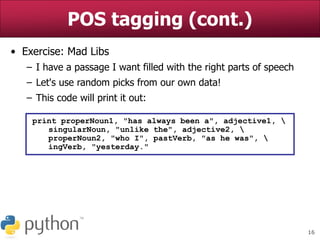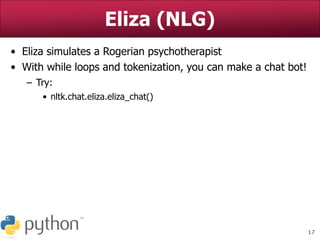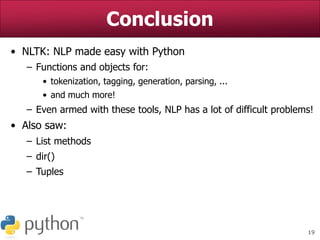NLTK Python Basic Natural Language Processing.ppt
- 1. Week 8 The Natural Language Toolkit (NLTK) Except where otherwise noted, this work is licensed under: http://creativecommons.org/licenses/by-nc-sa/3.0
- 2. 2 List methods • Getting information about a list – list.index(item) – list.count(item) • These modify the list in-place, unlike str operations – list.append(item) – list.insert(index, item) – list.remove(item) – list.extend(list2) • same as list += list2 – list.sort() – list.reverse()
- 3. 3 List exercise • Write a script to print the most frequent token in a text file.
- 4. 4 And now for something completely different
- 5. 5 • So far, we've studied programming syntax and techniques • What about tasks for programming? – Homework – Mathematics, statistics – Biology – Animation – Website development – Game development – Natural language processing Programming tasks? (Sage) (Biopython) (Blender) (Django) (PyGame) (NLTK)
- 6. 6 Natural Language Processing (NLP) • How can we make a computer understand language? – Can a human write/talk to the computer? • Or can the computer guess/predict the input? – Can the computer talk back? – Based on language rules, patterns, or statistics • For now, statistics are more accurate and popular
- 7. 7 Some areas of NLP • shallow processing – the surface level – tokenization – part-of-speech tagging – forms of words • deep processing – the underlying structures of language – word order (syntax) – meaning – translation • natural language generation
- 8. 8 The NLTK • A collection of: – Python functions and objects for accomplishing NLP tasks – sample texts (corpora) • Available at: http://nltk.sourceforge.net – Requires Python 2.4 or higher – Click 'Download' and follow instructions for your OS
- 9. 9 Tokenization • Say we want to know the words in Marty's vocabulary – "You know what I hate? Anybody who drives an S.U.V. I'd really like to find Mr. It-Costs-Me-100-Dollars-To-Gas-Up and kick him square in the teeth. Booyah. Be like, I'm Marty Stepp, the best ever. Booyah!" • How do we split his speech into tokens?
- 10. 10 Tokenization (cont.) • How do we split his speech into tokens? >>> martysSpeech.split() ['You', 'know', 'what', 'I', 'hate?', 'Anybody', 'who', 'drives', 'an', 'S.U.V.', "I'd", 'really', 'like', 'to', 'find', 'Mr.', 'It-Costs-Me-100- Dollars-To-Gas-Up', 'and', 'kick', 'him', 'square', 'in', 'the', 'teeth.', 'Booyah.', 'Be', 'like,', "I'm", 'Marty', 'Stepp,', 'the', 'best', 'ever.', 'Booyah!'] • Now, how often does he use the word "booyah"? >>> martysSpeech.split().count("booyah") 0 >>> # What the!
- 11. 11 Tokenization (cont.) • We could lowercase the speech • We could write our own method to split on "." split on ",", split on "-", etc. • The NLTK already has several tokenizer options • Try: • nltk.tokenize.WordPunctTokenizer – tokenizes on all punctuation • nltk.tokenize.PunktWordTokenizer – trained algorithm to statistically split on words
- 12. 12 Part-of-speech (POS) tagging • If you know a token's POS you know: – is it the subject? – is it the verb? – is it introducing a grammatical structure? – is it a proper name?
- 13. 13 Part-of-speech (POS) tagging • Exercise: most frequent proper noun in the Penn Treebank? – Try: • nltk.corpus.treebank • Python's dir() to list attributes of an object – Example: >>> dir("hello world!") [..., 'capitalize', 'center', 'count', 'decode', 'encode', 'endswith', 'expandtabs', 'find', 'index', 'isalnum', 'isalpha', 'isdigit', 'islower', 'isspace', 'istitle', 'isupper', 'join', 'ljust', 'lower', ...]
- 14. 14 Tuples • tagged_words() gives us a list of tuples – tuple: the same thing as a list, but you can't change it – in this case, the tuples are a (word, tag) pairs >>> # Get the (word, tag) pair at list index 0 ... >>> pair = nltk.corpus.treebank.tagged_words()[0] >>> pair ('Pierre', 'NNP') >>> word = pair[0] >>> tag = pair[1] >>> print word, tag Pierre NNP >>> word, tag = pair # or unpack in 1 line! >>> print word, tag Pierre NNP
- 15. 15 POS tagging (cont.) • How do we tag plain sentences? – A NLTK tagger needs a list of tagged sentences to train on • We'll use nltk.corpus.treebank.tagged_sents() – Then it is ready to tag any input! (but how well?) – Try these tagger objects: • nltk.UnigramTagger(tagged_sentences) • nltk.TrigramTagger(tagged_sentences) – Call the tagger's tag(tokens) method >>> tagger = nltk.UnigramTagger(tagged_sentences) >>> result = tagger.tag(tokens) >>> result [('You', 'PRP'), ('know', 'VB'), ('what', 'WP'), ('I', 'PRP'), ('hate', None), ('?', '.'), ...]
- 16. 16 POS tagging (cont.) • Exercise: Mad Libs – I have a passage I want filled with the right parts of speech – Let's use random picks from our own data! – This code will print it out: print properNoun1, "has always been a", adjective1, singularNoun, "unlike the", adjective2, properNoun2, "who I", pastVerb, "as he was", ingVerb, "yesterday."
- 17. 17 Eliza (NLG) • Eliza simulates a Rogerian psychotherapist • With while loops and tokenization, you can make a chat bot! – Try: • nltk.chat.eliza.eliza_chat()
- 18. 18 Parsing • Syntax is as important for a compiler as it is for natural language • Realizing the hidden structure of a sentence is useful for: – translation – meaning analysis – relationship analysis – a cool demo! • Try: – nltk.draw.rdparser.demo()
- 19. 19 Conclusion • NLTK: NLP made easy with Python – Functions and objects for: • tokenization, tagging, generation, parsing, ... • and much more! – Even armed with these tools, NLP has a lot of difficult problems! • Also saw: – List methods – dir() – Tuples

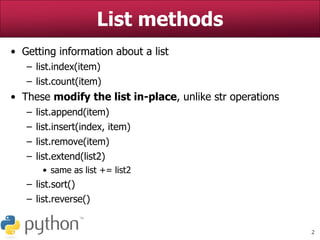
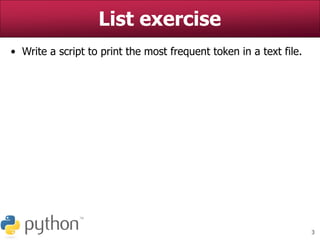
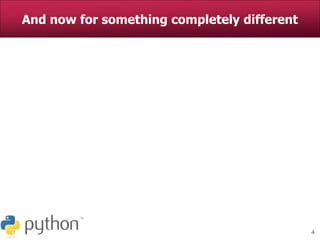
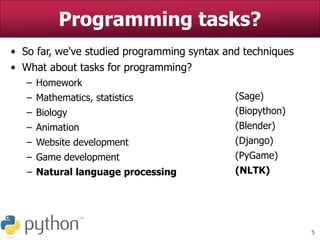
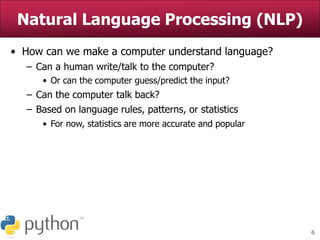



![10
Tokenization (cont.)
• How do we split his speech into tokens?
>>> martysSpeech.split()
['You', 'know', 'what', 'I', 'hate?', 'Anybody',
'who', 'drives', 'an', 'S.U.V.', "I'd", 'really',
'like', 'to', 'find', 'Mr.', 'It-Costs-Me-100-
Dollars-To-Gas-Up', 'and', 'kick', 'him',
'square', 'in', 'the', 'teeth.', 'Booyah.', 'Be',
'like,', "I'm", 'Marty', 'Stepp,', 'the', 'best',
'ever.', 'Booyah!']
• Now, how often does he use the word "booyah"?
>>> martysSpeech.split().count("booyah")
0
>>> # What the!](https://image.slidesharecdn.com/nltkpythonbasicnaturallanguageprocessing-220823130955-30b583c0/85/NLTK-Python-Basic-Natural-Language-Processing-ppt-10-320.jpg)
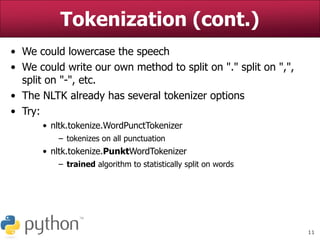

![13
Part-of-speech (POS) tagging
• Exercise: most frequent proper noun in the Penn Treebank?
– Try:
• nltk.corpus.treebank
• Python's dir() to list attributes of an object
– Example:
>>> dir("hello world!")
[..., 'capitalize', 'center', 'count',
'decode', 'encode', 'endswith', 'expandtabs',
'find', 'index', 'isalnum', 'isalpha',
'isdigit', 'islower', 'isspace', 'istitle',
'isupper', 'join', 'ljust', 'lower', ...]](https://image.slidesharecdn.com/nltkpythonbasicnaturallanguageprocessing-220823130955-30b583c0/85/NLTK-Python-Basic-Natural-Language-Processing-ppt-13-320.jpg)
![14
Tuples
• tagged_words() gives us a list of tuples
– tuple: the same thing as a list, but you can't change it
– in this case, the tuples are a (word, tag) pairs
>>> # Get the (word, tag) pair at list index 0
...
>>> pair = nltk.corpus.treebank.tagged_words()[0]
>>> pair
('Pierre', 'NNP')
>>> word = pair[0]
>>> tag = pair[1]
>>> print word, tag
Pierre NNP
>>> word, tag = pair # or unpack in 1 line!
>>> print word, tag
Pierre NNP](https://image.slidesharecdn.com/nltkpythonbasicnaturallanguageprocessing-220823130955-30b583c0/85/NLTK-Python-Basic-Natural-Language-Processing-ppt-14-320.jpg)
![15
POS tagging (cont.)
• How do we tag plain sentences?
– A NLTK tagger needs a list of tagged sentences to train on
• We'll use nltk.corpus.treebank.tagged_sents()
– Then it is ready to tag any input! (but how well?)
– Try these tagger objects:
• nltk.UnigramTagger(tagged_sentences)
• nltk.TrigramTagger(tagged_sentences)
– Call the tagger's tag(tokens) method
>>> tagger = nltk.UnigramTagger(tagged_sentences)
>>> result = tagger.tag(tokens)
>>> result
[('You', 'PRP'), ('know', 'VB'), ('what', 'WP'),
('I', 'PRP'), ('hate', None), ('?', '.'), ...]](https://image.slidesharecdn.com/nltkpythonbasicnaturallanguageprocessing-220823130955-30b583c0/85/NLTK-Python-Basic-Natural-Language-Processing-ppt-15-320.jpg)
